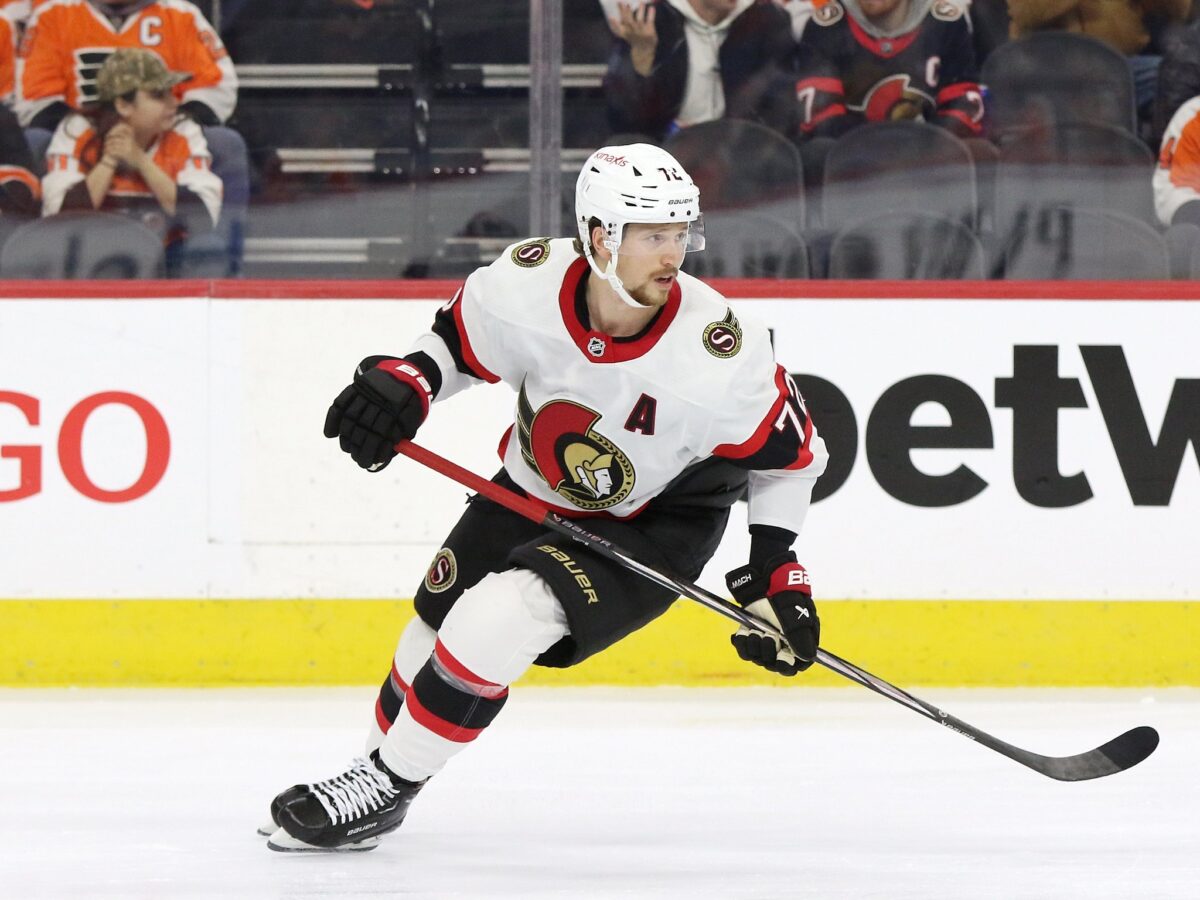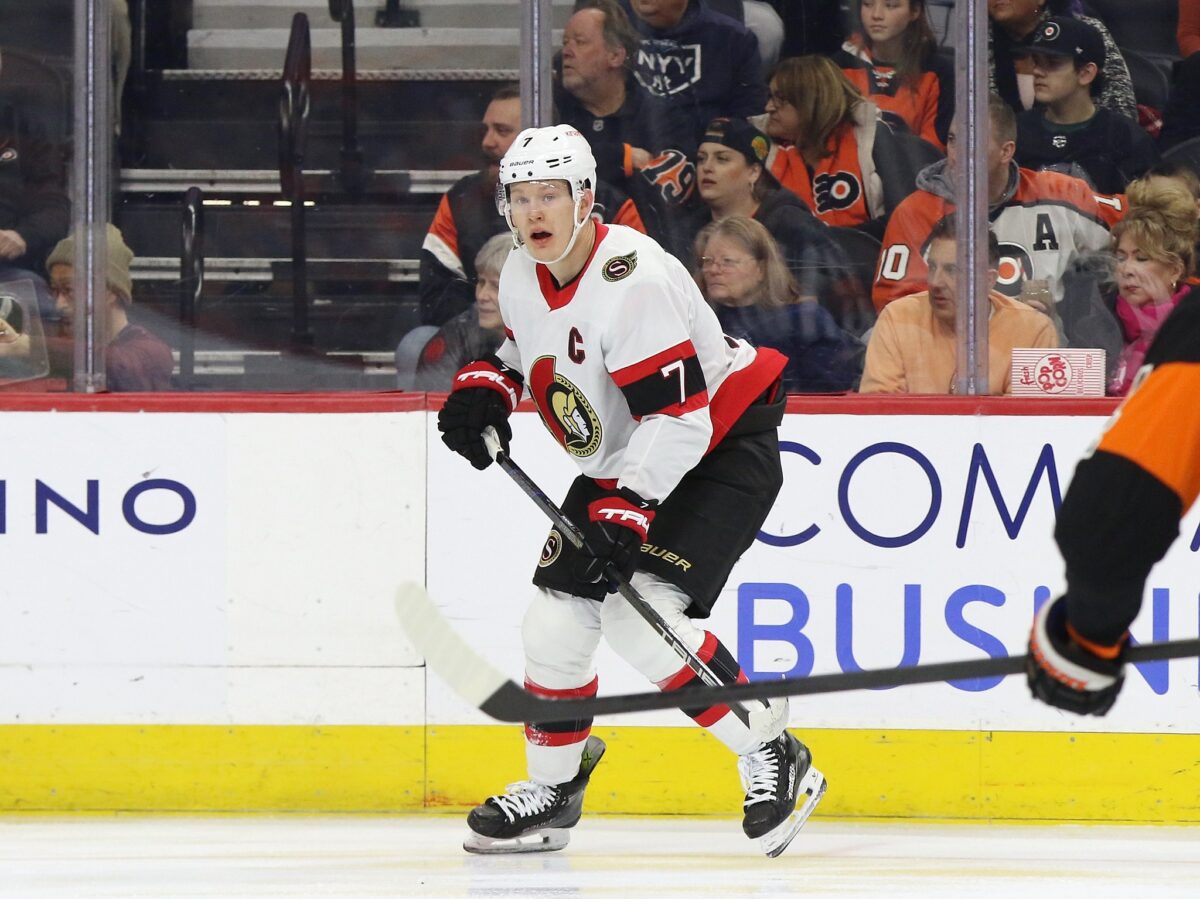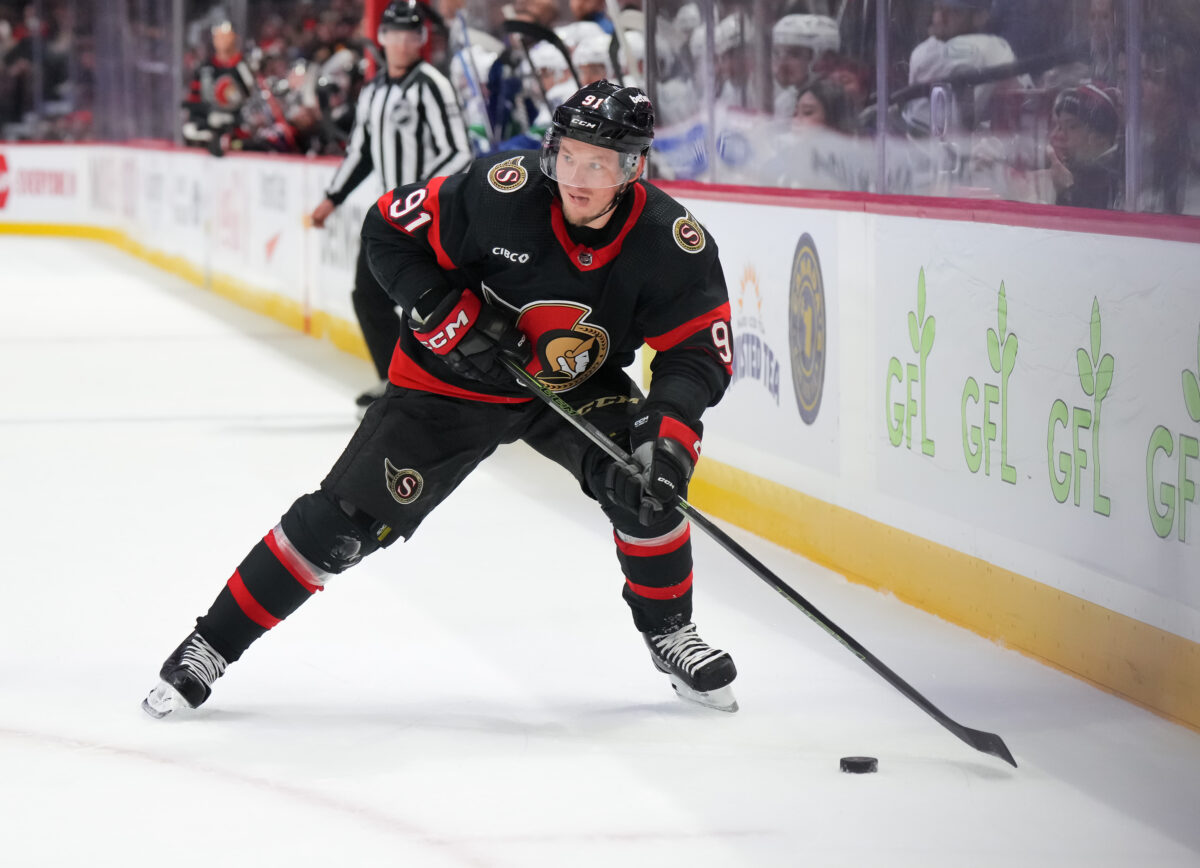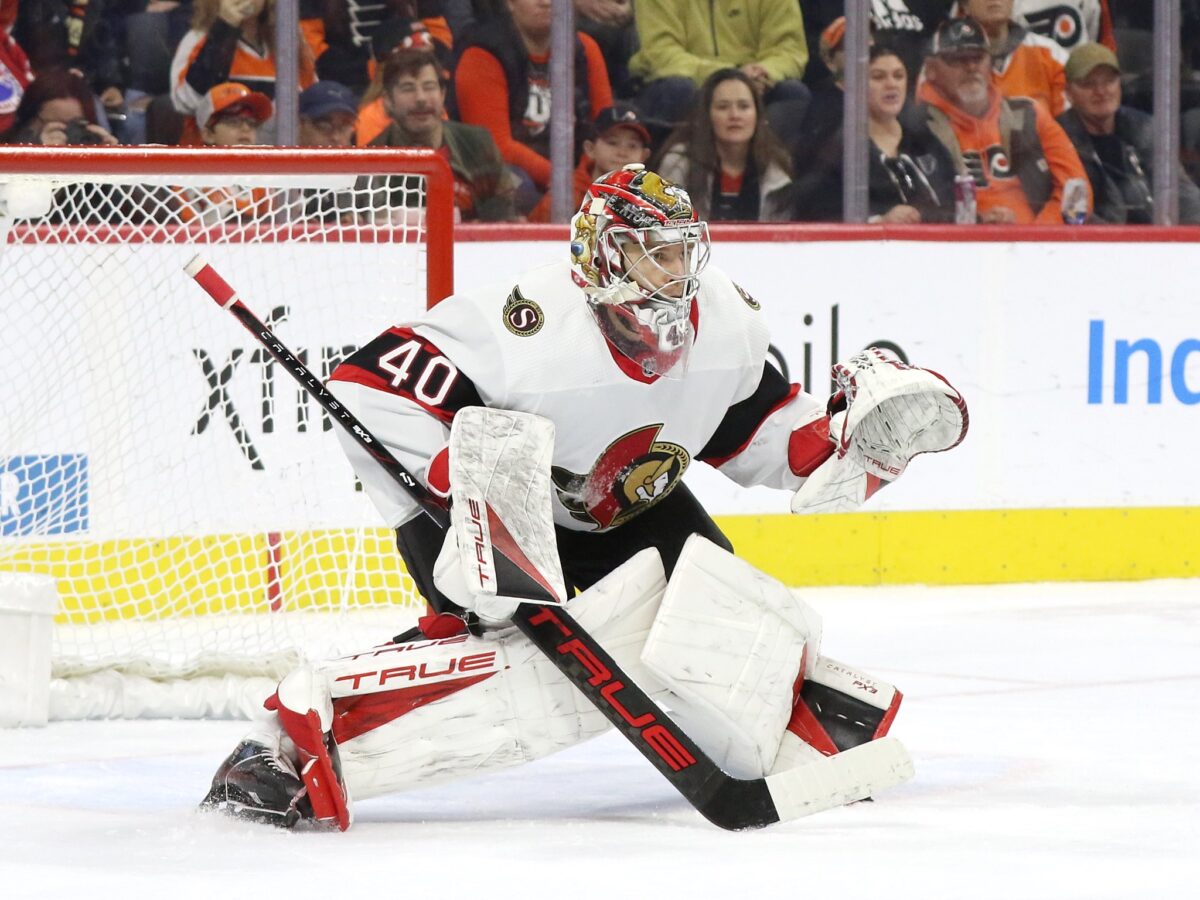When the NHL announced that they were not going to participate in the 2018 Olympics, fans and players were understandably upset. They had been robbed of a best-on-best tournament; no league-created event, from the All-Star Game to the ironically named World Cup of Hockey, ever came close to the prestige and competitiveness of the Olympics. So, when the NHL announced that they would officially return to the Olympics in 2026 in Milan, Italy, and the yet-to-be-announced 2030 games, everyone breathed a collective sigh of relief. For the first time since 2014, we could see a true best-on-best tournament again.
Despite the games still being two years away, it’s hard not to imagine who could end up being on various Olympic hockey rosters, especially from teams with young rosters like the Ottawa Senators. Despite their disappointing season so far, there’s no question that at least a few players will end up on their respective nation’s rosters, but there may be more than you realize. Here are the top candidates from the Senators that could end up playing in the 2026 Olympics.
Canada – Thomas Chabot and Jakob Chychrun
After two tournaments where it felt like Canada was scraping the bottom of the proverbial barrel to ice a competent team, the selection committee will have too many options for the 2026 Olympics. That means it’s going to be difficult for any of the Senators’ top Canadians to crack an incredibly deep roster. Claude Giroux will likely be too old to join, while Drake Batherson is unlikely to outperform the likes of Mitch Marner, Mat Barzal, or Mark Stone. However, two current defenders have a shot at making it.
Thomas Chabot is arguably the most likely Senator to play for Canada. A former 50-point scorer, he’s been one of Ottawa’s best all-around defencemen when healthy. However, lately, that caveat has been a big one, as he’s missed at least 14 games in each of the past three seasons, including 2023-24. But that doesn’t change the fact that he’s a clutch performer. He already has three World Championships under his belt, captaining the 2022 silver-medallists, and was Canada’s top scorer at the 2017 World Juniors, earning him the tournament’s MVP award.

Jakob Chychrun has also been bitten by the injury bug for most of his career, but he’s been healthy this season and has emerged as one of the Senators’ best offensive defencemen. After 47 games, he’s on pace to post career-high totals in assists and points. The defensive aspect of his game isn’t as well-rounded, which has been put in the spotlight this season thanks to the team’s struggles, but he’s still a talented two-way presence that could give Canada a dangerous blue line. The only knock against him, though, is that he hasn’t been on an international team since 2015-16 when he represented Canada at the U-18 World Juniors. But, at just 25 years old, he’ll be in his prime in two years, making him a player to watch, even though he may not be in Ottawa by that time.
USA – Brady Tkachuk and Jake Sanderson
If there’s one team that will be tougher to crack than the Canadians, it’ll be the Americans. Looking at who could potentially make the 2026 team reveals that this team is practically guaranteed to win a medal. With Auston Matthews, Jason Robertson, Jack Hughes, Kyle Connor, and Clayton Keller, it’s hard to imagine the USA not finishing in the top three, if not already a gold-medal favourite. Yet a couple of Senators should have a big hand in their success.
First is Brady Tkachuk, who, despite the Senators’ struggles this season, is on pace to set a career-high in goals and, if the team continues to string together wins, could realistically hit the 40-goal mark. He’s also on pace to set a career-high in penalty minutes, which shows his willingness to mix it up when needed. He’s a fiery competitor and alongside his brother Matthew, the Americans will have an incredibly frustrating top six. He’s also just 24 years old, and it’s hard not to think he could emerge as a 50-goal threat over the next two seasons.

Then there’s Jake Sanderson, who, despite being the Senators’ youngest rostered defencemen, has been one of their best. As a sophomore, he is on pace to hit 12 goals and 42 points while playing all 82 games while playing some of the most defensively sound hockey on the team. Like the Canadians, the Americans will have a stacked blue line, but what gives him a leg up is that he already has Olympic experience, having played one game for the Americans at the 2022 tournament in Beijing. Given that he’s still just 21 years old, he’s not only a lock for the team, but could reasonably compete for a top pairing spot.
Russia – Vladimir Tarasenko and Artem Zub
Although the International Ice Hockey Federation (IIHF) has remained steadfast in its ban on Russian and Belarusian players at all their tournaments, the International Olympic Committee (IOC) has opened the door to allow all athletes to compete for their home nation. In a press release in January 2023, a multi-step plan was outlined for the two nations to compete in 2024 and 2026, with the board stating, “No athlete should be prevented from competing just because of their passport.” That means that, even if they can’t compete under their flag, Russians are likely to be back at the Olympics, and a couple of current Senators could end up on the roster.
Vladimir Tarsenko may no longer be the player he once was, but he’s also not quite over the hill yet. With 13 goals this season, he sits fourth on the team in scoring and is playing at a 60-point pace, which is an upgrade from his 2022-23 season. He also was a regular member of the Russian international teams before 2021, playing in three World Championships and the 2014 Olympics before his home country was banned from most hockey competitions. At 32 years old, he’s more of a long shot and won’t be in a prominent role, but he could bring some veteran experience to a young, talented team.

Artem Zub has a better chance to end up on Russia’s 2026 roster after his role on the 2018 Olympic team. His defensive presence helped the Olympic Athletes of Russia win gold over the upstart Germans and led to him earning an NHL contract two years later. He’s also played in three World Championships, and at just 28 years old, he’s got a lot of years left as a top shutdown defender, which will be crucial if Russia wants to survive against the Canadians and Americans.
Germany – Tim Stutzle
The Germans will have a much tougher time with NHLers back in the mix, but Tim Stutzle will give them a fighting chance. There is arguably no other player in Ottawa right now who has a higher ceiling than the German superstar; as a teenager, he was already one of the best players in the Deutsche Eishockey Liga (DEL) and was named the best forward at the 2021 World Juniors after scoring 10 points in five games.
Related: United States’ Projected Roster for the 2026 Winter Olympics
In the NHL, he hit 90 points in just his second season with the Senators. He’s received criticism this season for his lack of production, but he’s still producing at a point-per-game pace. With the direction the Senators are heading, he has a chance to hit 100 points for the first time since 2006-07. Alongside Leon Draisaitl, JJ Peterka, and Lukas Reichel, the Germans will remain a threat in 2026.
Czechia – Dominik Kubalik
Dominik Kubalik hasn’t been a great fit in Ottawa since coming over in the Alex DeBrincat trade. Still, he has been one of Czechia’s best forwards internationally, making him a good bet for the 2026 Olympic team. At the 2023 World Championship, he led the Czechs with 12 points and led the tournament with eight goals, making him an easy selection for the All-Star team. While his time in Ottawa is likely ending in the next few weeks, the Czechs will save him a spot in their middle six.
Denmark – Mads Sogaard
Denmark is not a lock to make the 2026 Olympics, but they aren’t a long shot. Currently ranked 11th by the International Ice Hockey Federation, the small nation is primed to secure one of the three remaining spots, granted that the format is the same as the 2022 tournament. Right now, Frederik Andersen is a lock to start for the Danes, but he’ll need a capable backup, and there aren’t many better options than Mads Sogaard.

While his NHL numbers have been shaky this season, Sogaard has been one of the best goalies in the American Hockey League, putting up a .922 save percentage over 17 games with the Belleville Senators. He also has plenty of international experience, including two World Junior appearances and a World Championship call in 2021. But what gives him an edge is his 2022 selection to the Danish Olympic Qualifying team. Although he sat for three games behind starter Sebastien Dahm, he was impressive enough as a 22-year-old to be included on the team. In 2026, he’ll be practically a lock.
Senators Have Plenty of Olympic Potential
It may be surprising to some, especially when looking at how the 2023-24 season has gone, but the Senators are primed to have several current and former members at the 2026 Olympics. This team is young and skilled and will only continue to get better. Just look at how they performed ahead of the All-Star Break, winning five of their last eight and coming away with at least a point in their three losses. Big things are coming for Ottawa, and while it’s taken a while to get there, those skills will surely be on full display in Milan.
